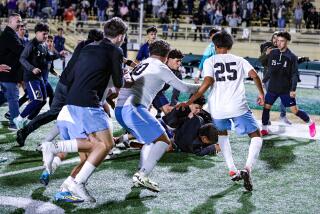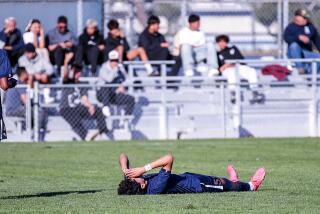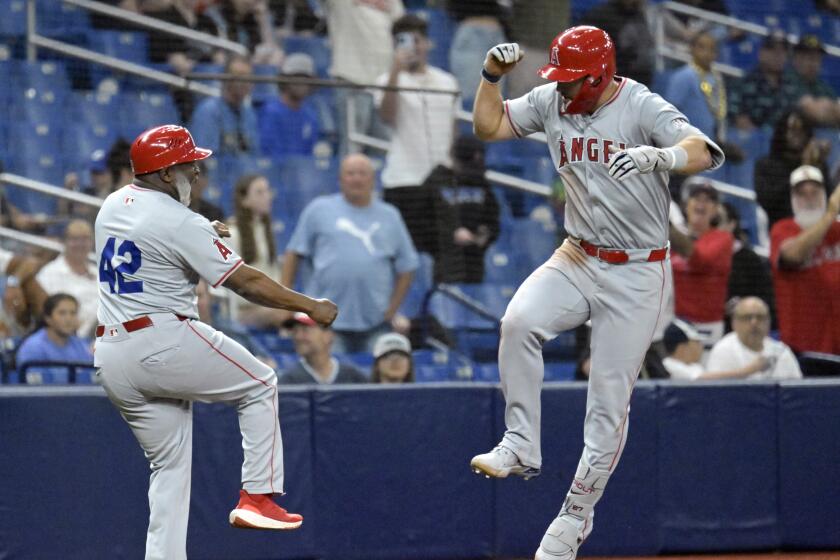A little variety doesn’t hurt
There’s an urgent need to restore the concept of cross-training to the vocabulary of high school coaches, athletes and parents.
There used to be this theory that practicing skills necessary for one sport helped in another, such as jumping in basketball aiding volleyball or running in track improving speed for football and soccer. And every so often, an athlete discovered a previously unknown talent when he or she tried another sport.
Then came the era of specialization, when the idea of focusing on one sport year-round is the only way to become the best.
People have forgotten, amid dreams of college scholarships or rich pro contracts, that the teenage years are for experimentation, discovery and finding something in which to excel.
It was almost too late for Waldo Jimenez. A soccer fanatic since age 6, he made the starting lineup for Lake Balboa Birmingham’s soccer team as a junior. But a friend decided to go out for track in the off-season and persuaded Jimenez to join him.
Last spring, Jimenez made it to the City track finals in the 1,600 meters, finishing eighth in 4 minutes 28 seconds. This fall, he went out for cross-country and has emerged as a potential City champion.
In his first race last month at the Irvine Woodbridge Invitational, he ran 15:28, one second short of a school record. Then he set a course record at Elysian Park, running 16:28 for three miles in a nonleague meet. He won the Warren-Stauffer Invitational in South Gate, running 15:18, a Birmingham record for that race. Last weekend, he won the Gordon Weisenburger Invitational at Elysian Park in 16:01.
Suddenly, he likes cross-country better than soccer, and no one is sure how fast he may eventually run.
“If I had a time machine, I’d travel back in time and start as a ninth grader,” Jimenez said. “I love to run.”
Jimenez still plans to play soccer in the winter, when cross-country is over, and there’s no doubt he’ll be quicker and stronger because of the stamina he has gained. Come spring, he could be a City title contender in the 800, 1,600 or 3,200 depending on how quickly he improves.
“He’ll get better because he doesn’t know what he’s doing,” Birmingham cross-country Coach Scott King said. “All I told him was follow the leaders.”
In his first appearance of the season last Thursday at Pierce College, where the City finals are held, Jimenez finished second to City favorite Jared Long of Woodland Hills El Camino Real. Jimenez was told by his coach not to go for the lead for fear he might take a wrong turn.
“He would have ended up in Chatsworth if he took the lead,” King said of Jimenez, who had never run the course before.
If he had stuck solely with soccer, Jimenez might never have learned of his talent for distance running.
These days, it’s difficult to be a multiple-sport athlete because of the demands, commitments and infighting that takes place.
Too many parents are buying into the year-round selling job of club coaches and personal trainers and keeping their sons and daughters in a singular sport.
Later, high school coaches become the roadblocks. Few are willing to make compromises with other coaches on practice and training schedules, sometimes giving ultimatums and forcing athletes to make decisions they might eventually regret.
It’s not surprising coaches are reluctant to relinquish year-round control of their players. There’s the fear of injury, the concern of not being able to develop team chemistry with players coming and going and the simple fact that having your own players with you all the time makes for a better team.
Thankfully, many smaller schools have bought into the benefits of developing multi-sport athletes, with coaches and administrators working to encourage participation, sometimes out of necessity.
Of course, playing more than one sport isn’t for everybody. The time commitment might be too challenging for teenagers having trouble with their studies.
But in the case of Jimenez, he has become a better student since discovering competitive running because he’s more motivated to succeed in the classroom to help his chances of earning a college scholarship.
And it has changed his life in other ways -- he’s eating healthier and going to bed earlier.
“I think it’s in me,” Jimenez said of running. “I think it’s fate.”
So let’s hope that cross-training is no longer simply a slogan used to sell shoes. It can be a valuable asset in the total sports experience.
Eric Sondheimer can be reached at eric.sondheimer@latimes.com.
More to Read
Get our high school sports newsletter
Prep Rally is devoted to the SoCal high school sports experience, bringing you scores, stories and a behind-the-scenes look at what makes prep sports so popular.
You may occasionally receive promotional content from the Los Angeles Times.







